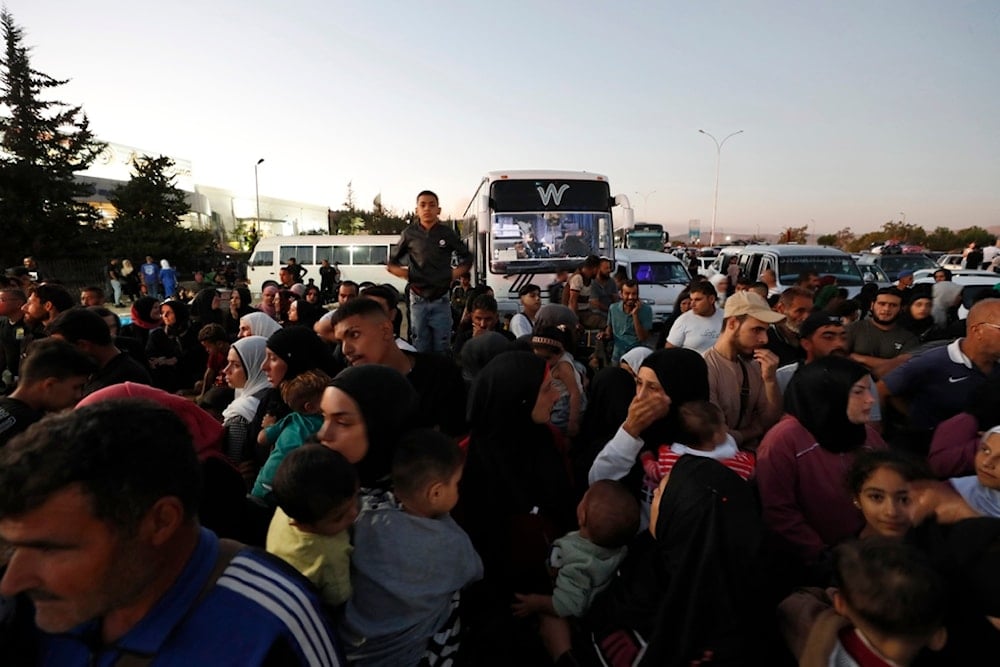UN says region cannot bear another refugee crisis amid war on Lebanon
The Israeli occupation's war on Lebanon has left tens of thousands displaced, and with ongoing displacement crises, the UN warns that the region cannot bear another.
-

Syrians fleeing the war in Lebanon arrive at the Syrian-Lebanese border crossing in Jdeidet Yabous, Syria, Wednesday, September 25, 2024. (AP)
The United Nations refugee agency (UNHCR) has raised alarms over a potential displacement crisis in the Middle East as Israeli aggression continues to devastate Lebanon, where thousands of Lebanese civilians, along with Syrian refugees who had sought shelter in Lebanon, are fleeing for their lives.
The situation has led to thousands crossing into Syria, essentially creating another refugee crisis.
"Thousands of Lebanese and Syrian people are fleeing Lebanon for Syria in desperation as Israeli airstrikes continue to devastate civilian lives," said Filippo Grandi, the UN High Commissioner for Refugees, in a statement. "The Middle East cannot afford a new displacement crisis."
The situation at the Syrian border is dire, with hundreds of vehicles backed up in long queues, while others are making the crossing on foot. Among the refugees are women, children, and babies, many of whom spent the night outdoors in dropping temperatures.
Some of the fleeing civilians carry fresh injuries from recent Israeli bombardments, which have been taking a heavy toll on civilians, displacing tens of thousands from their homes. "It is yet another ordeal for families who previously fled war in Syria, only now to be bombed in the country where they sought shelter," Grandi noted. "We must avoid replaying these scenes of despair and devastation."
The UNHCR, in collaboration with the Syrian Arab Red Crescent, is offering critical assistance at border points. Those displaced are receiving food, water, blankets, and mattresses, along with guidance on additional support available within Syria.
Syrian Health Ministry announced full readiness despite difficulties
The humanitarian crisis is further compounded by Syria’s already dire situation, following a devastating earthquake earlier this year and years of conflict that have left its infrastructure in ruins.
However, in a heartwarming show of solidarity and despite its own woes, the Syrian Ministry of Health announced its full readiness around the clock to provide medical and emergency services to those arriving from Lebanon. Emergency medical personnel are on standby 24/7 to offer immediate health responses, particularly through the emergency hotline 110.
In light of the ongoing aggression on Lebanon, Syrian President Bashar al-Assad addressed the new government, stating, "Our primary focus now is to stand with our brothers in Lebanon in all areas without exception or hesitation."
In a statement, the Governor of Rural Damascus, Ahmad Ibrahim Khalil, confirmed his visit to the Jdeidet Yabous border crossing with Lebanon. He emphasized the importance of facilitating the return of Syrians and Lebanese nationals to Syria.
"We have urged officials at the crossing to offer all possible assistance to both Syrians and Lebanese returning to the country," Khalil stated. Additionally, he noted that the governorate had prepared shelters and medical centers and provided food supplies and drinking water to accommodate the influx of refugees.
Meanwhile, Brigadier General Moheeb al-Moudi, Director of Civil Defense in Homs, revealed that five main shelters, capable of accommodating around 40,000 people, have been established in Homs, along with nine additional shelters with a capacity of 25,000 people.
Lebanon, already home to approximately 1.5 million Syrian refugees and 11,000 refugees from other countries, is struggling to manage this new wave of displacement. "Let us not create one [crisis] by forcing more people to abandon their homes," Grandi concluded.

 3 Min Read
3 Min Read








